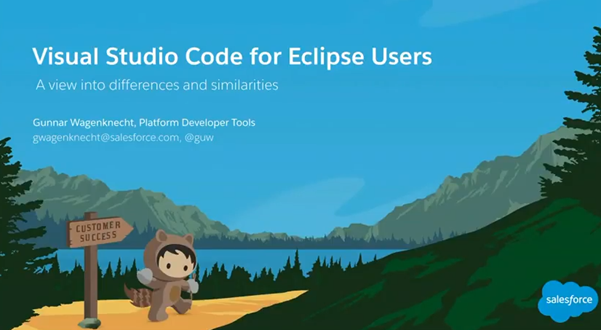
- #Salesforce eclipse on mac how to
- #Salesforce eclipse on mac install
- #Salesforce eclipse on mac download
- #Salesforce eclipse on mac mac
I usually keep multiple eclipse workspaces for various stuff like Eclipse housekeeping and RAM usage boosts with the number of open projects and files in workspace, a decent boost can be noticed by closing unused projects in workspace.

Too many open projects and filesWe end up checking out or creating multiple projects for various clients or own research. I know we have un-install plugin feature, but that has messed me a few times by leaving traces of crap. Once you feel that a plugin in experimental installation is of real good use and stable, you can move it to the core Eclipse installation.
#Salesforce eclipse on mac download
One can download standalone version from here : I personally use it for all related development and find it good and better in startup and normal usage speeds.
#Salesforce eclipse on mac install
A good example is IDE, some developers tend to download JEE version of eclipse and install IDE as a plugin on top of that, this combination is of no use until you are JEE developer your self. I have seen developers downloading Eclipse variants with support of lots of languages and features, most of which we usually don’t need. Too many pluginsHaving an Eclipse running with too many un-used plugins doesn’t helps. But that also not guarantees a good performance if your IDE is not having good defaults.
#Salesforce eclipse on mac how to
How to fix Performance ? One simple way to boost performance is to use an extremely good configuration machine. As IDE itself is based on Eclipse, so most of the tips apply to IDE users as well. This post tries to cover a couple of Eclipse flavours/variants and ways to fix performance and memory issues on the same.

If this heap falls below a certain level, you might see Eclipse crash with errors like “ OutOfMemoryError: Java heap space”. Here I just share some experiences since IBM sold Notes to the other company, their Q&A web pages get more and more broken and Google tends to show results of recent timeline but not helpful if the issue is tangled, unpopular or ancient.Eclipse needs a decent amount of heap(Memory | RAM) to work smoothly, minimal heap sizes start from 256 MB RAM and upper limit to that value usually depends on the eclipse plugins and amount of physical RAM installed on your machine.Ĭhances of eclipse being slow on low heap configuration are high, this is because you are overloading your processor and disk in classic RAM Disk swap cycles and CPU processing going on during the same. But I can't replicate this issue no longer. This still doesn't make sense why Eclipse error only pop up once if I always run the Terminal through the Dock. Replacing the shortcut in the Dock seems to fix my problem. Then I tried to switch the execution between Dock and Launchpad. And I walked through all of the bash_profile and bashrc files for system-wide and user space. My immediate thought was "Does any environment get changed from the bash configuration profiles?" MacOS has a complicated initial steps.

The error never happened again unless I reboot the mac. My symptom was, Eclipse run and came out the error only for one time after a reboot.

Reboot a couple of time and the one in Dock doesn't jump out Eclipse error any more. Eventually I removed the old Terminal icon from the Dock, execute a native one from Launchpad and pin this new icon from "Keep in Dock." Then my problem is gone. I always have a habit to keep Terminal in Dock, instead of pressing F4 key and launching it from the "Other" folder in Launchpad. To make long story short, my conclusion is, maybe my Terminal shortcut in the Dock is hijacked somewhere somehow.
#Salesforce eclipse on mac mac
The real question would be: Why is Eclipse executed when we purely click on the regular mac native "Terminal" app? Plenty of steps I've made and here I can just provide two cents instead of confident resolution. I have the exact same situation and google leads me to this unanswered thread.


 0 kommentar(er)
0 kommentar(er)
